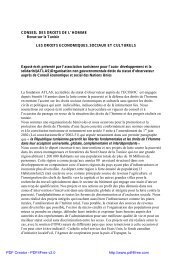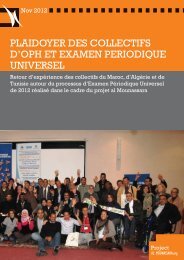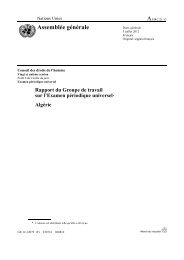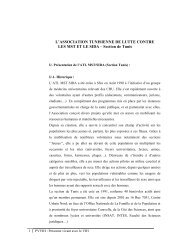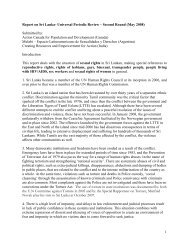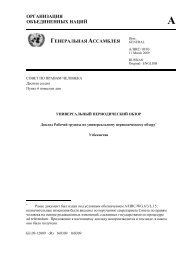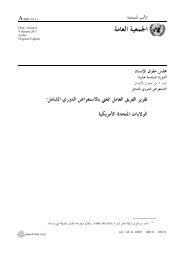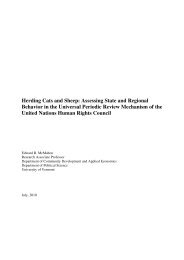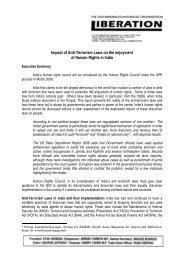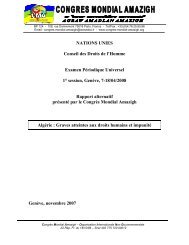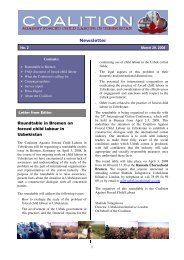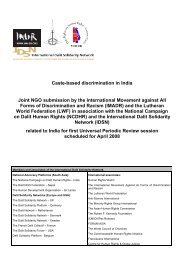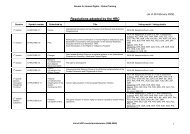1 - Universal Periodic Review
1 - Universal Periodic Review
1 - Universal Periodic Review
Create successful ePaper yourself
Turn your PDF publications into a flip-book with our unique Google optimized e-Paper software.
4.1.3. CriminalizationThere is a significant increase in criminal cases being filed against agrarian reformpetitioners. The charges are mainly filed by the landowners’ agents, and includequalified theft, malicious mischief, trespassing, libel and estafa. Such charges in the firstinstance fail to recognize or respect the actual legal land and tenure rights of thepetitioners under the Comprehensive Agrarian Reform Law (CARL). Meanwhile, theCARL states that agrarian reform related cases should not be tried in the regular courts.Yet landowners and their agents are making frequent use of the civil and penal codes toharass peasant agrarian reform petitioners, unfortunately with the active support of theprovincial prosecutor and local judge. Farmers often do not have sufficient funds to postbail (forcing them to borrow or remain in jail), much less money to hire lawyers to defendthemselves in court. DAR lawyers do not normally represent tenants involved in agrarianrelated criminal cases.The Mission learned of 189 cases filed against 196 petitioners, mainly in the vast VillaReyes (San Andres) and the Matias hacienda (San Francisco). Some of the affectedpetitioners told how they were violently arrested as a result of the dubious criminal casesfiled against them. Since 1996 more than 300 farmers have been imprisoned. From May12 th 2006 42 farmers were jailed after they voluntarily surrendered to the authorities atthe police camp in Manila. 48 more farmers have pending warrants of arrests. Theirliberty is denied unnecessarily by state agencies, which allow them to be used as toolsof the landowners.4.1.4. Lack of effective ownership and control of the land resourceFor agrarian reform petitioners still caught up in extremely onerous sharing systems,and for those who have been forcibly evicted or displaced as a consequence ofcontinuing harassments, the right to food is severely violated. Without access to the landthat is rightfully due them under the CARL, they lack economic or physical access toadequate food, and what is more, they no longer have access to their rightful means forits procurement. Petitioners without land titles are especially vulnerable to foodinsecurity and harassments from land owners and their allies.4.1.5. Specific Recommendations(i) Once they petition for their legal land and tenure rights under the CARL, tenantsbecome extremely vulnerable to all manner of legalistic and extra-legal retaliatoryactions of landlords. Such retaliatory actions also directly undermine the agrarian reformpetitioners’ ability to construct and maintain an adequate rural livelihood, which in turnweakens their capacity to sustain their position on the land. This situation worsens thelonger the CARP implementation process drags on. The government, through the DAR,should hasten implementation of CARP so as to make as short as possible the amountof time petitioners have to wait before gaining full ownership and control of the land.(ii) The killing of agrarian reform petitioners by non-state actors is unacceptable andshould not be tolerated. Suspects in the murder cases should immediately be arrestedby state authorities and brought to trial. Witnesses should be protected, and the victims’IFFM 2006 Final Report 18



